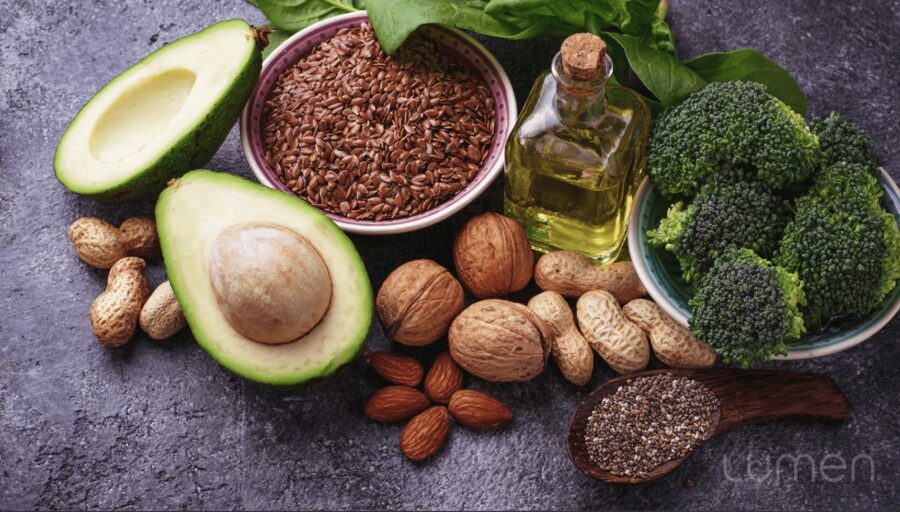7 metabolic benefits from a vegetarian diet you might not know

Reaching Metabolic Health with Vegetarian Diets: A Path to Effective Weight Loss
In a world where high sugar raves and fast food has become the norm, many individuals struggle with the consequences of unhealthy lifestyles, including weight gain and poor metabolic health.
Although many Americans attempt to maintain a healthy diet, a significant number of them fail to consume the recommended daily servings of fruits and vegetables.
While some people have been led to believe that restricting high-carb fruits and vegetables in their diet will help them reach their goals - carbs are not your enemy.
Consuming the right carbs for your body at the right time makes the difference. This lack of proper nutrition is holding people back from a healthier lifestyle.
Following a plant-based diet tailored to your body may improve metabolism by providing essential nutrients, vitamins, and minerals required to help you reach your health goals. This article will explore the connection between a vegetarian diet and metabolic health, revealing how you can effectively lose weight and improve overall well-being.


The Power of Plant-Based Diets
Today, plant-based diets have grown and many restaurants are incorporating vegetarian and vegan options into their menus. The number of Americans who follow a vegan diet increased by 600% from 2014 to 20181.
The vegetarian diet consists of fruits, vegetables, grains, nuts, seeds, and legumes naturally rich in fiber, vitamins, minerals, and antioxidants, but also allows eggs and dairy. These essential nutrients play a vital role in supporting a healthy metabolism.
Research has shown that people who follow a plant-based diet have a lower body mass index (BMI) and a reduced risk of obesity and chronic diseases2.
The high fiber content in plant-based foods aids digestion, promotes satiety, and helps maintain stable blood sugar levels, essential for a well-functioning metabolism. Moreover, plant-based diets are rich in antioxidants that help reduce inflammation, a critical factor in improving metabolic health3.
The Metabolic Benefits of a Vegetarian Diet - According To Research
Adopting a vegetarian diet has numerous benefits for metabolic health, including:
Improved insulin sensitivity: Plant-based diets are known to increase insulin sensitivity, which helps regulate blood sugar levels and promotes a healthy metabolism4.
Reduced inflammation: Vegetarian diets are rich in antioxidants and anti-inflammatory compounds that help reduce chronic inflammation, significantly contributing to metabolic dysfunction5.
Enhanced gut health: A plant-based diet supports a diverse and healthy gut microbiome, which is crucial for optimal metabolism and overall health6.
Weight loss: Numerous studies have demonstrated that individuals following a vegetarian diet tend to have lower body weight and reduced risk of obesity compared to those who consume animal products.
Nutrient-rich: This diet is generally rich in complex carbs, omega 6 fatty acids, dietary fibers, carotenoids, folic acid, vitamin C, vitamin E and magnesium. Diets rich in fiber are associated with a lower risk of developing metabolic syndrome because increasing plant-origin protein (and replacing animal-origin protein) helps increase dietary fiber intake7.
Encourages satiety: High-fiber foods promote a feeling of fullness, reduce your cravings, and reduce your likelihood of overeating.
Lower cholesterol levels: Foods high in saturated fat may trigger the body to produce extra cholesterol. Plants do the opposite as they are generally low in saturated fat and are cholesterol-free. The soluble fiber you consume in plants helps to slow down the absorption of cholesterol. These foods include oatmeal, barley, some fruits and vegetables8.

Can you lose weight with a vegetarian diet?
Following a vegetarian diet can help aid in weight loss if whole foods, such as fruits and vegetables are prioritized over processed foods. The high fiber content of many vegetarian-friendly foods helps to promote satiety and a healthy, well-functioning metabolism which is essential for a healthy weight.
Achieving a Vegetarian Diet for Metabolic Health with Practical Tips
To optimize your metabolism and support weight loss through a vegetarian diet, it's important to prioritize nutrient-dense, whole plant-based foods.
Lumen metabolic coaches recommend:
Focusing on consuming a variety fruits, vegetables, whole grains, legumes, nuts, and seeds to ensure optimal nutrient intake.
"Although we're talking plant-based diets, monitoring your protein intake is also an important macro to meet."
Marine Melamed, R.D. Nutritionist at Lumen
Prioritize Whole-Foods
Choose whole and nutrient-dense foods. Ensuring your diet includes plant-based protein sources such as beans, lentils, tofu, tempeh, seitan, and quinoa to ensure adequate protein intake for muscle maintenance and growth.
Practice Portion Control
If you're looking for meal prep ideas for weight loss, incorporating healthy plant-based foods into your routine can be a game-changer. Using a food log that accurately measures your macro intake suited for your metabolism. Even with healthy plant-based foods, it is essential to practice portion control to avoid overeating.
Master Your Meal Timing
Getting your meal timing right will help you focus on consuming your carbs (especially slow-absorption) earlier. In the evening, opt for a lighter low carb diet dinner and pack on the nutrient-dense vegetables.

What vegetarian foods are high in protein?
High-protein vegetarian food sources include: seitan, soy (tofu, tempeh, edamame), beans, lentils, nutritional yeast, nuts, seeds (hemp seeds, chia seeds), whole/sprouted grains, and spirulina. Some vegetarian diets may also allow for eggs and dairy products (milk, yogurt, cheese).
Foods to Avoid in a Vegetarian Diet for Weight Loss
Processed foods and snacks
Steer clear of processed foods and snacks, which are often high in unhealthy fats, salt, and sugar. These food items can sabotage your weight loss efforts by contributing empty calories and offering little nutritional value. Instead, opt for whole foods and prepare your meals at home to maintain control over the Ingredients.
Sugary Drinks and Desserts
You must limit your consumption of sugary drinks and desserts, as these calorie-laden treats can hinder your progress. Excess sugar intake can lead to weight gain, insulin resistance, and even type 2 diabetes. To satisfy your sweet tooth, reach for naturally sweet fruits or choose healthier dessert alternatives like dark chocolate or yogurt with fresh berries.
High-Fat Dairy Products
While dairy products offer essential nutrients, avoiding high-fat options is vital when focusing on weight loss. Full-fat cheese, cream, and butter can add unwanted calories and unhealthy saturated fats to your diet. Opt for low-fat or plant-based food to monitor your calorie intake and support your weight loss goals.

Monitoring Metabolic Health During Weight Loss
Measuring metabolic health indicators
Measuring your metabolic health indicators is essential for your weight loss journey because it provides valuable information about how your body functions and processes energy. You shouldn’t just check numbers on your scale; measuring your metabolic health indicators can better understand your overall health and how well you’re responding to diet and exercise.
Take the Personalized Approach
You can develop a more targeted and effective weight loss plan by keeping tabs on your metabolic health. You’ll be able to identify potential issues early on and address them accordingly, fostering a healthier and more efficient journey.
Check-in for Sustainable Results
Tracking your metabolic health allows you to understand your body’s unique needs better. This fosters a weight loss journey that delivers long-lasting, sustainable results rather than short-term success followed by a discouraging rebound.
Balance All Aspects of Your Lifestyle
When incorporating healthy eating habits, it's important to integrate positive lifestyle changes such as movement, high-quality sleep, and stress management.
It's important to combine your plant-based diet with regular physical activity to boost your metabolism and support weight loss.
A good way to track your progress is by utilizing technology and personalized nutrition plans: Leverage technology, such as fitness trackers and nutrition apps, to monitor your progress and receive personalized meal plans based on your unique metabolic needs.
People also asked:
How can a vegetarian get 30 grams of protein in a meal?
Answer: To get a good source of protein in a vegetarian meal, you should include one or more high-protein vegetarian sources. For example, include 3.5 ounces of tempeh (19g of protein) with 1 cup of brown rice (5g of protein) and ½ cup of black beans (8g of protein) for a meal that contains 32 grams of protein total.
How to get 100 grams of vegetarian protein?
Answer: If you are trying to consume at least 100 grams of vegetarian-friendly protein sources per day, you want to split this up between meals and snacks.
For example, aim for 25-30 grams of protein per meal and 5-10g of protein per 1-2 snacks per day.
Below is an example of a vegetarian meal plan that includes 100 grams of protein:
- Breakfast: low-sugar Greek yogurt with berries (15g) and 2 hard-boiled eggs (14g)
- Snack: ½ cup roasted edamame (11g).
- Lunch: 3.5 ounces of Seitan (25g) w/ 1 cup of quinoa (8g) and roasted vegetables
- Snack: 1 ounce of popcorn with 1 tablespoon of nutritional yeast (4g) and ¼ cup of almonds (7g)
- Dinner: 3.5 ounces of tempeh (19g) with 1 cup of brown rice (5g) and ½ cup of black beans (8g) Total protein: 116g






 Digital download
Digital download 


